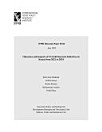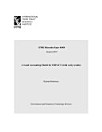Landscape complexity as determined by socioeconomic trends, climate change, and broad agricultural policies: A study on multifunctional landscapes
Cenacchi, Nicola · Petsakos, Athanasios · Robertson, Richard D. · Song, Chun · Mishra, Abhijeet
2025년 7월 · IFPRI Discussion Papers 2343권 · Intl Food Policy Res Inst
eBook
55
페이지
family_home
적용 가능
info
report검증되지 않은 평점과 리뷰입니다. 자세히 알아보기
eBook 정보
Food systems face dire challenges, including climate change, biodiversity loss, and resource overuse. To ensure their long-term sustainability and resilience they need urgent transformation, while continuing to support livelihoods and address rising food insecurity. The design and management of multifunctional agricultural landscapes offer a pathway to address these challenges; and improved understanding of landscape complexity, including a diverse mix of natural and cropland covers, can help advance achievement of multiple food system goals. As land managers and decision makers plan for the future of our landscapes, they need to recognize that powerful forces outside their control will have a strong influence on the final outcome. This study explores the interplay between global drivers—such as population growth, economic trends, climate change—and landscape complexity, using a modeling system linking a global agricultural economic model to a land-use model. Global trends are described, and Kenya serves as a case study, representing broader local dynamics. Results indicate that the majority of agricultural landscapes, globally and in Kenya, are projected to experience increased complexity by 2050, primarily through cropland expansion at the expense of natural habitats. However, there are a few instances where an expansion in cropland may be liked to a decrease in landscape complexity. Patterns also vary under alternative scenarios of agricultural development. Where greater complexity is achieved through policies that further concentrate agricultural land in some areas, this is mainly associated with net gains in natural habitats and a contraction of cropland. Overall, this preliminary research underscores the need for integrated landscape management and more comprehensive scenarios to inform sustainable land-use planning aligned with global food security and environmental objectives.
이 eBook 평가
의견을 알려주세요.
읽기 정보
스마트폰 및 태블릿
노트북 및 컴퓨터
컴퓨터의 웹브라우저를 사용하여 Google Play에서 구매한 오디오북을 들을 수 있습니다.
eReader 및 기타 기기
Kobo eReader 등의 eBook 리더기에서 읽으려면 파일을 다운로드하여 기기로 전송해야 합니다. 지원되는 eBook 리더기로 파일을 전송하려면 고객센터에서 자세한 안내를 따르세요.








